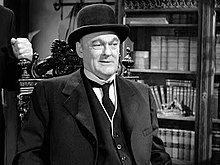

Last week, I challenged Harvard economics professor Greg Mankiw’s interpretation of Mr. Potter in the classic movie It’s a Wonderful Life. Greg has responded by email and given me permission to quote it. (By the way, he was a junior economist when I was a senior economist with President Reagan’s Council of Economic Advisers and, although we see each other rarely, get along well. He’s a genuinely good guy and so none of my criticism reflects any animus towards him.)
Recall that I had admitted one of Greg’s points but disputed others. In his original post, Greg had written:
Mr Potter makes his money dishonestly and uses it to control the instruments of the government to further enrich himself and impoverish the lives of those around him.
Here’s the key part of my response:
Where Greg gets it wrong is his comment about Henry Potter. Potter is conniving. But we have no evidence in the movie, other than his wrongly holding on to $8,000 that was not his, that “he makes his money dishonestly.” Potter provides a service: rental housing. There’s no evidence that he cheats his tenants. There’s also no evidence that he uses his money “to control the instruments of the government to further enrich himself and impoverish the lives of those around him.”
Here’s Greg’s email:
1. Your caveat about the stolen $8000 seems pretty big to me. (“Other than that Mrs. Lincoln,….) That is the evil act that pushes the whole plot forward.
2. Potter tries to close the Building and Loan by hiring George. An antitrust violation? Surely, an attempt to suppress competition.
3. In the alternative universe, where everyone is miserable, the town’s name has been changed to Potterville. This name change must be intended to signal Mr. Potter’s oligarchic control.
And now my response, seriatim.
The first point is Greg’s strongest point. I think it’s possible that Potter makes his money dishonestly. And the $8,000 certainly is evidence. It’s just that it’s not strong evidence. People often compartmentalize. He may have yielded to temptation here but not had a policy of cheating. Although Greg is right that his sneakily holding on to the $8,000 “is the evil act that pushes the whole plot forward,” that is a separate issue.
On the second point, it may have been an antitrust violation and it may have been an attempt to suppress competition. But that doesn’t mean either that he’s dishonest or that he’s using his money “to control the instruments of the government,” which was Greg’s original point. Indeed, if someone brought, say, a private antitrust suit against Potter, it would be that suer who used his money to control the instruments or, at least, one instrument, of government. (The late Fred McChesney’s entry, “Antitrust,” in The Concise Encyclopedia of Economics pointed out, at least at the time of writing, that “for every case brought by government, private plaintiffs bring ten.” Many of these are against their competitors.)
On the third point, the name change to Pottersville certainly does “signal Mr. Potter’s oligarchic control.” But that wasn’t Greg’s original point. What we don’t know, in this alternate universe, is whether Potter got this control dishonestly or by controlling the instruments of government. That he did is plausible, but there’s no evidence for it. As for the idea that “everyone is miserable” in Pottersville, I’m not so sure. Check out this scene. If drinking alcohol is a normal good, then there might be a lot of prosperity in Pottersville. I know that that life isn’t for me and isn’t, I suspect, for Greg either, but other people might quite like it.
One last thing to check, because I know most people don’t read the comments, is this comment on my original post by high school economics teacher Bernard Strass.

READER COMMENTS
john hare
Feb 5 2019 at 9:13pm
How certain is it that most people don’t read the comments? I consider comments to be one of the strong features of blogs that clarify and control content to some degree.
A local advertising paper had in bold Illegal immigrants cost each Florida taxpayer $942.00 per year.* There was no method of providing any alternative points as there is here. That’s why I like blogs with comment sections.
*very close to that though I don’t remember the exact number.
Robert EV
Feb 6 2019 at 11:30am
How is using one’s money to compel the government to do its actual job “controlling an instrument of government”? It seems to me more in the vein of unfair taxation (requiring someone else pay to do what the government is supposed to be doing in the first place).
Comments are closed.